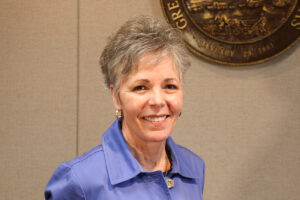Interview of Cynthia (Cindy) Lane, March 25, 2025
Interviewed by Mark Tallman
Cindy Lane's leadership has helped transform Kansas education to benefit Kansas children. This interview shows the impact she had on education policy, from special education to the Kansas Board of Regent's newest endeavor, the Blueprint for Literacy. This quote from Dr. Lane sums up the interview: "Most of my career in KCK as a leader was to focus on outcomes that actually transformed kids’ lives, that opportunity piece." From changes in special education , to court cases on school finance, to the Kansas Board of Regents, she is still working to transform kids' lives.



